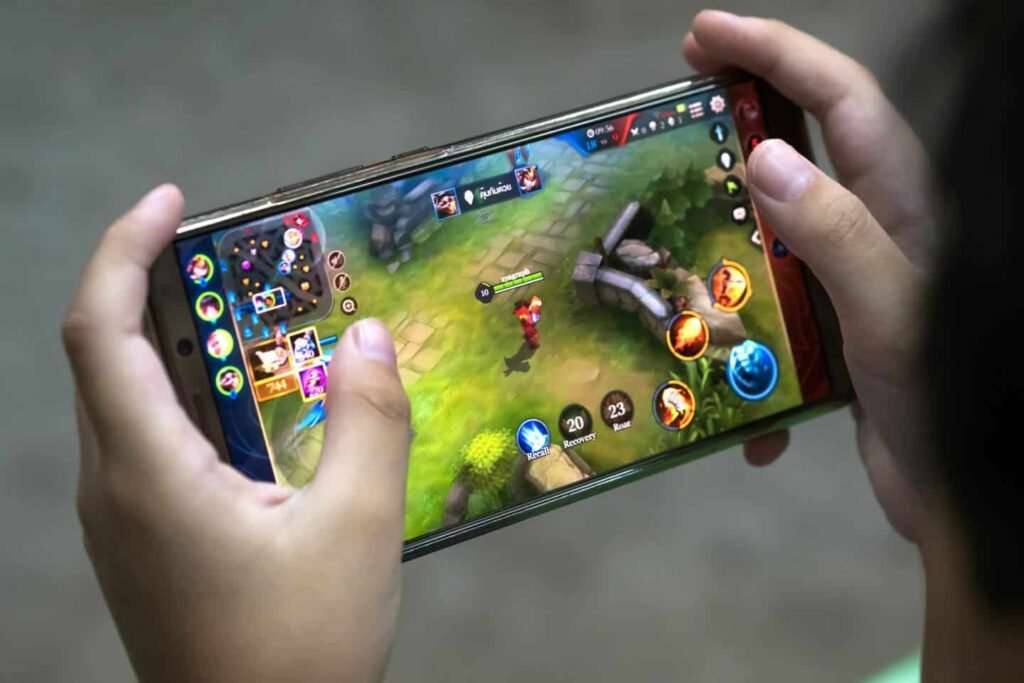The Evolution of Mobile Gameing
Mobile gameing has become an integral part of our daily lives, transforming our smartphones and tablets into portable entertainment hubs. With the continuous advancement in technology, mobile games have evolved far beyond simple time-fillers, offering immersive experiences comparable to traditional console and PC gameing. In this blog, we delve into the intricacies of mobile gaming, exploring its features, trends, and the impact it has on the gaming industry.

Accessibility and Convenience
- One of the most significant advantages of mobile gaming is its accessibility. With millions of games available for download on app stores, players have a vast library of options at their fingertips.
- Mobile games offer unparalleled convenience, allowing users to play anytime, anywhere. Whether it’s during a commute, a lunch break, or lounging at home, mobile gaming fits seamlessly into our busy lifestyles.
Graphics and Visuals
- Gone are the days of pixelated graphics and simplistic designs. Modern mobile games boast stunning visuals and intricate details, rivaling those found in console and PC titles.
- Advanced graphics engines and hardware capabilities of smartphones have enabled developers to push the boundaries of visual fidelity, delivering breathtaking landscapes and lifelike characters.
Immersive Gameplay
- Mobile games now offer immersive gameplay experiences, ranging from captivating storylines to intense multiplayer battles.
- Innovative control schemes, such as touch gestures, gyroscopic sensors, and virtual buttons, provide intuitive ways to interact with the game world, enhancing immersion and engagement.
Social Integration
- Social features have become integral to many mobile games, enabling players to connect with friends, join communities, and participate in multiplayer competitions.
- Integration with social media platforms allows players to share their achievements, invite friends to play, and collaborate on challenges, fostering a sense of camaraderie and competition.
Free-to-Play and In-App Purchases
- The free-to-play model has dominated the mobile gameing landscape, allowing players to download games for free and generate revenue through in-app purchases.
- In-app purchases offer players the option to enhance their gameing experience by unlocking additional content, acquiring virtual goods, or gaining competitive advantages.
Cross-Platform Compatibility
- Cross-platform compatibility has become increasingly prevalent in mobile gameing, allowing players to enjoy their favorite games across multiple devices.
- Games with cloud-based save systems enable seamless progression, allowing players to switch between smartphones, tablets, and even PCs without losing their progress.
Augmented Reality (AR) and Virtual Reality (VR)
- The integration of AR and VR technologies has opened up new possibilities for mobile gameing, blurring the lines between the virtual and real worlds.
- AR games overlay digital content onto the real environment, offering unique experiences that incorporate elements of the player’s surroundings.
- VR games provide immersive 3D environments that transport players to fantastical worlds, offering a heightened sense of presence and immersion.
Game Diversity and Genres
- Mobile gameing offers a diverse range of genres to cater to different preferences and interests. From action-packed shooters and strategy games to relaxing puzzles and simulations, there’s something for everyone.
- The availability of niche genres and indie titles on app stores allows players to explore unique and experimental games that may not have gained traction on traditional gameing platforms.
Live Events and Community Engagement
- Many mobile games host live events, tournaments, and seasonal updates to keep players engaged and invested in the game world.
- Community engagement initiatives such as developer Q&A sessions, player forums, and in-game polls foster a sense of community and belonging among players, encouraging long-term participation and loyalty.
Game Streaming and Cloud Gaming:
- Game streaming services and cloud gaming platforms have gained momentum in the mobile gaming industry, allowing players to stream high-quality games directly to their devices.
- These platforms leverage cloud infrastructure to render games remotely, enabling players to access console and PC-quality gaming experiences on their smartphones and tablets
Offline Gameplay

- While many mobile games require an internet connection for multiplayer features and live updates, there’s also a significant market for offline games.
- Offline games allow players to enjoy uninterrupted gaming experiences, particularly in areas with limited or unreliable internet access, such as during travel or in remote locations.
Mobile gameing has undergone a remarkable evolution, transcending its origins as simple time-wasters to become sophisticated entertainment experiences. With advancements in technology, mobile games continue to push the boundaries of what’s possible, offering stunning visuals, immersive gameplay, and social connectivity. As the mobile gaming industry continues to grow, we can expect even more innovations and breakthroughs that will shape the future of gameing.

